Unit 3 Will people have robots? (Section A Gramar Focus--3c)课件
文档属性
| 名称 | Unit 3 Will people have robots? (Section A Gramar Focus--3c)课件 |
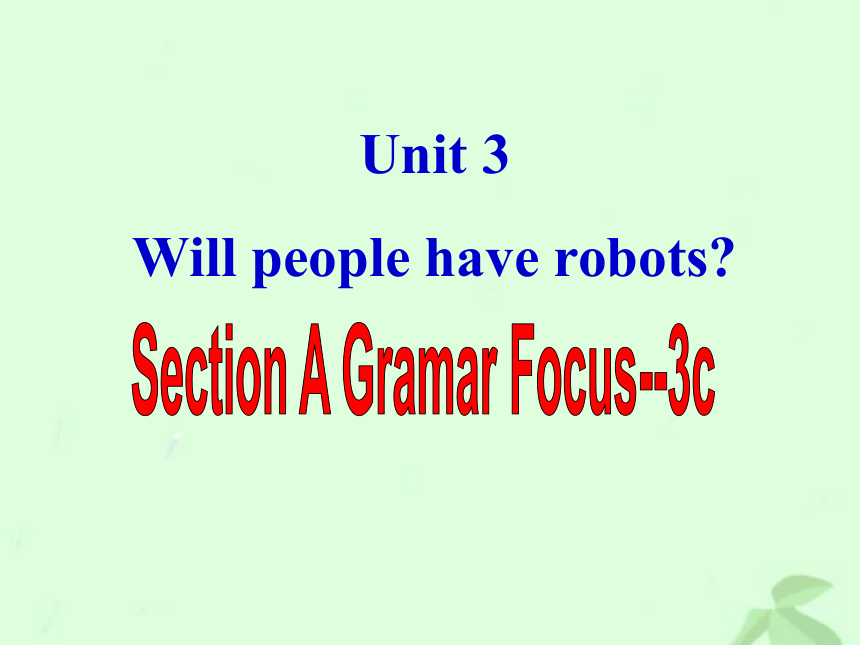
|
|
| 格式 | zip | ||
| 文件大小 | 527.1KB | ||
| 资源类型 | 教案 | ||
| 版本资源 | 鲁教版 | ||
| 科目 | 英语 | ||
| 更新时间 | 2016-01-17 00:00:00 | ||
图片预览

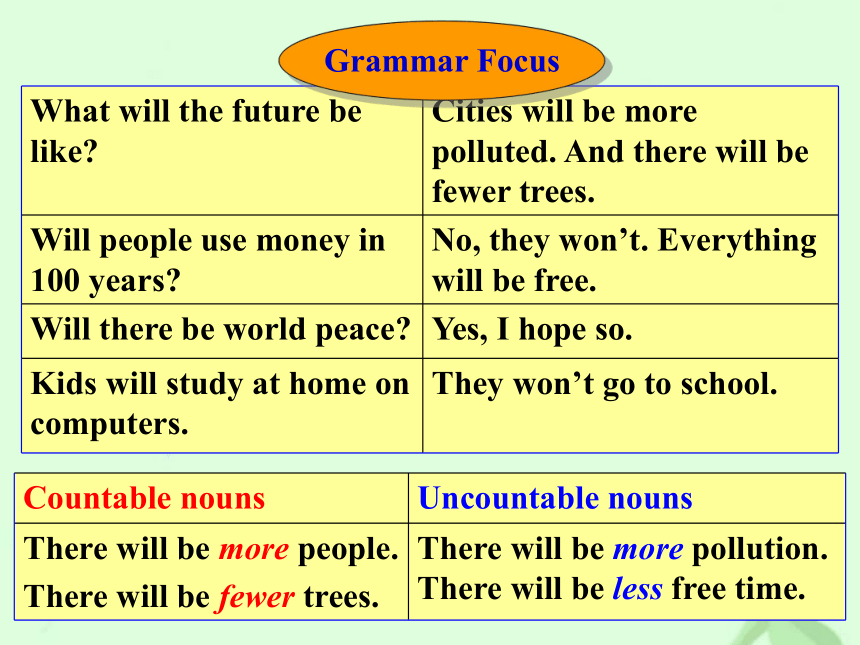
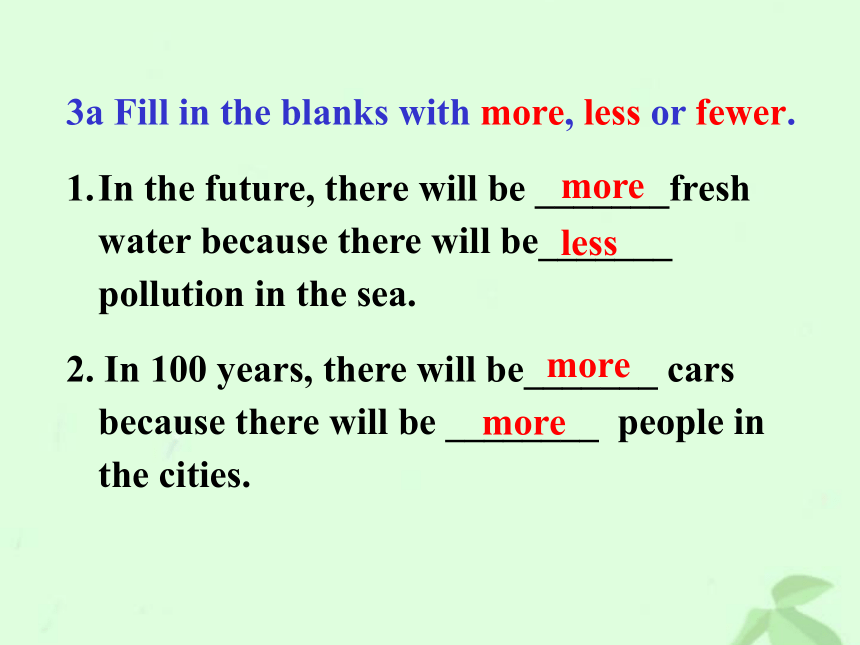
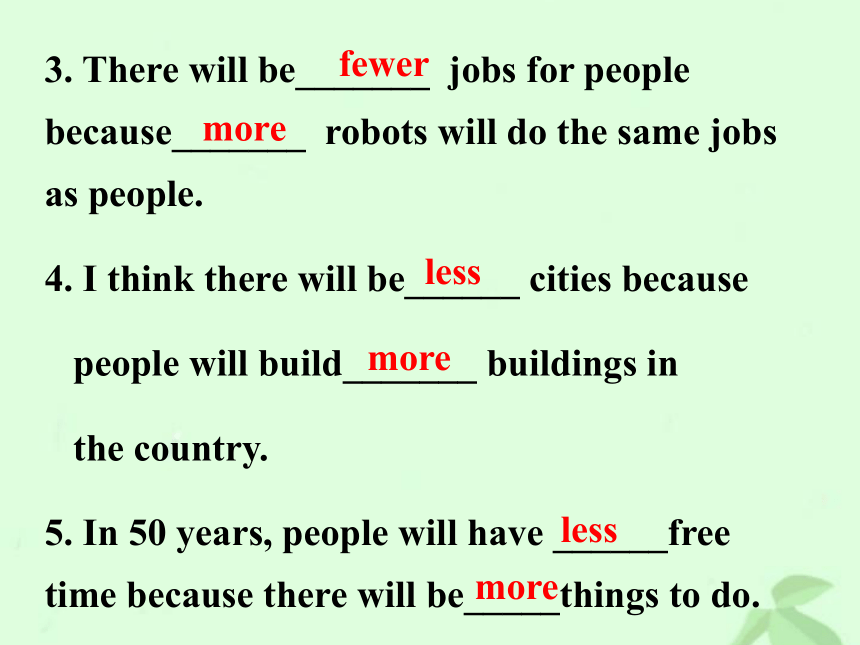
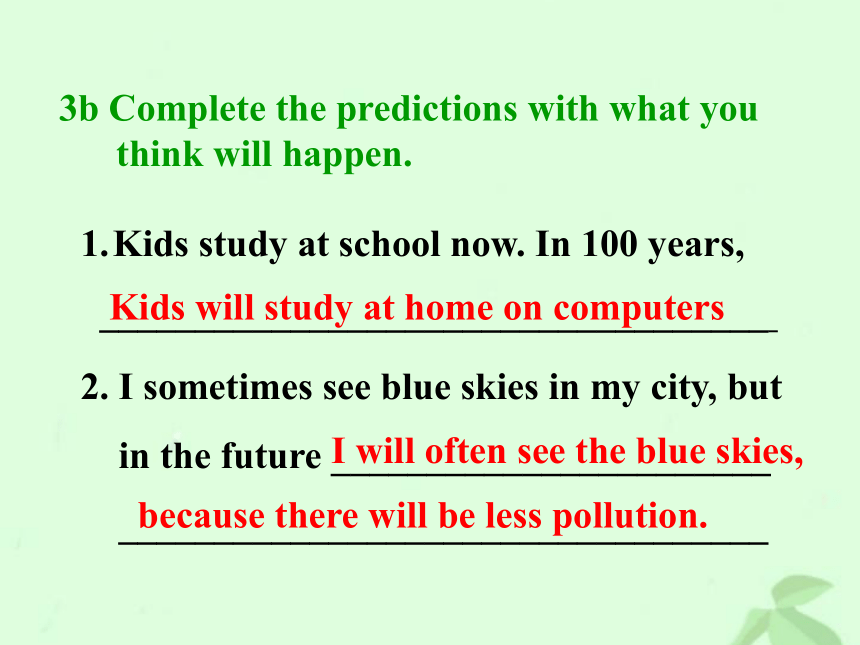

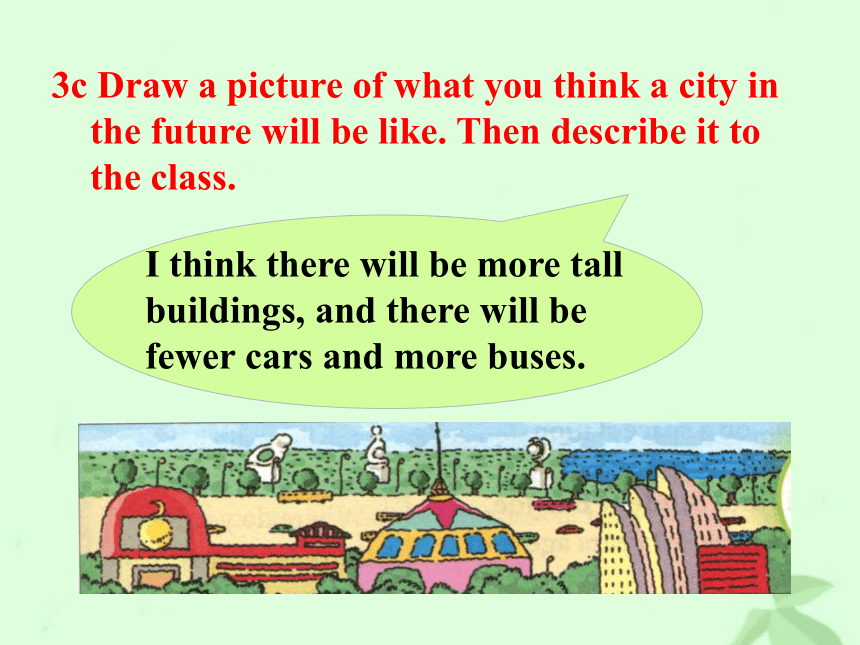
文档简介
课件14张PPT。Unit 3
Will people have robots?Section A Gramar Focus--3cGrammar Focus3a Fill in the blanks with more, less or fewer.
In the future, there will be _______fresh water because there will be_______ pollution in the sea.
2. In 100 years, there will be_______ cars because there will be ________ people in the cities.morelessmoremore3. There will be_______ jobs for people because_______ robots will do the same jobs as people.
4. I think there will be______ cities because
people will build_______ buildings in
the country.
5. In 50 years, people will have ______free time because there will be_____things to do.fewermorelessmorelessmore3b Complete the predictions with what you
think will happen.
Kids study at school now. In 100 years,
___________________________________ 2. I sometimes see blue skies in my city, but
in the future _______________________
__________________________________Kids will study at home on computersI will often see the blue skies,
because there will be less pollution.
4. Families usually spend time together on
weekends, but maybe in 200 years______
___________________________________
___________________________________
3. People now usually live to be about 70-80
years old, but in the future_____________
____________________________________
People will live to be 200 years old.everyday can be weekends , because
they have robots to do everything.I think there will be more tall buildings, and there will be fewer cars and more buses.3c Draw a picture of what you think a city in
the future will be like. Then describe it to
the class.What can you see in this picture?50 years laterThere will be more people.
There will be fewer trees.
There will be more pollution.
There will be more buildings.
There will be more cars.
There will be less fresh air.There will be…将会有Changes Grammar Focus一般将来时—— The simple future tense 概念:
(1)表示将要发生的动作或存在的状态。
We will go to see him tomorrow.
我们明天来看他。
(2)表示将来经常或反复发生的动作。
From now on, I will come every day.
从现在起,我每天都来。肯定句否定句一般疑问句特殊疑问句主语 + will +V原形主语 + will +not + V原形Will +主语 + V原形特殊疑问词 + 一般疑问句2. 基本句型 简略回答Yes, I will. No, I won’t. (注意缩写形式)3. Will 表示将来时态,其后常跟的时间
状语tomorrow 明天 next week 下周
next year 明天 before 不久
next month 下个月 soon 不久
the day after tomorrow 后天
the year after next 后年
the week after next 下下周一般将来时—— The simple future tense 1.There be 的一般将来时,表示:将来存在有
(1)肯定句:there will be…
e.g. There will be more people.
There will be fewer trees.
(2)否定句:there won’t be…
e.g. There won’t be more papers.
There won’t be more buildings.2. I think there will be more pollution.
(宾语从句)
某地有某物(表存在) There be
某人有某物(表拥有) have / has
2) there be 接词要运用就近(临近)原则
There is a book and two bags. There are two bags and a book.1) 有3. there be 句型的时态变化
一般过去时 There was / were…
一般现在时 There is / are…
一般将来时 There will be…
e.g. There is a book on the table.
There will be more people in this city .
There won’t be rain soon.
--Will there be rain?
--Yes, there will. / No, there won’t.
Will people have robots?Section A Gramar Focus--3cGrammar Focus3a Fill in the blanks with more, less or fewer.
In the future, there will be _______fresh water because there will be_______ pollution in the sea.
2. In 100 years, there will be_______ cars because there will be ________ people in the cities.morelessmoremore3. There will be_______ jobs for people because_______ robots will do the same jobs as people.
4. I think there will be______ cities because
people will build_______ buildings in
the country.
5. In 50 years, people will have ______free time because there will be_____things to do.fewermorelessmorelessmore3b Complete the predictions with what you
think will happen.
Kids study at school now. In 100 years,
___________________________________ 2. I sometimes see blue skies in my city, but
in the future _______________________
__________________________________Kids will study at home on computersI will often see the blue skies,
because there will be less pollution.
4. Families usually spend time together on
weekends, but maybe in 200 years______
___________________________________
___________________________________
3. People now usually live to be about 70-80
years old, but in the future_____________
____________________________________
People will live to be 200 years old.everyday can be weekends , because
they have robots to do everything.I think there will be more tall buildings, and there will be fewer cars and more buses.3c Draw a picture of what you think a city in
the future will be like. Then describe it to
the class.What can you see in this picture?50 years laterThere will be more people.
There will be fewer trees.
There will be more pollution.
There will be more buildings.
There will be more cars.
There will be less fresh air.There will be…将会有Changes Grammar Focus一般将来时—— The simple future tense 概念:
(1)表示将要发生的动作或存在的状态。
We will go to see him tomorrow.
我们明天来看他。
(2)表示将来经常或反复发生的动作。
From now on, I will come every day.
从现在起,我每天都来。肯定句否定句一般疑问句特殊疑问句主语 + will +V原形主语 + will +not + V原形Will +主语 + V原形特殊疑问词 + 一般疑问句2. 基本句型 简略回答Yes, I will. No, I won’t. (注意缩写形式)3. Will 表示将来时态,其后常跟的时间
状语tomorrow 明天 next week 下周
next year 明天 before 不久
next month 下个月 soon 不久
the day after tomorrow 后天
the year after next 后年
the week after next 下下周一般将来时—— The simple future tense 1.There be 的一般将来时,表示:将来存在有
(1)肯定句:there will be…
e.g. There will be more people.
There will be fewer trees.
(2)否定句:there won’t be…
e.g. There won’t be more papers.
There won’t be more buildings.2. I think there will be more pollution.
(宾语从句)
某地有某物(表存在) There be
某人有某物(表拥有) have / has
2) there be 接词要运用就近(临近)原则
There is a book and two bags. There are two bags and a book.1) 有3. there be 句型的时态变化
一般过去时 There was / were…
一般现在时 There is / are…
一般将来时 There will be…
e.g. There is a book on the table.
There will be more people in this city .
There won’t be rain soon.
--Will there be rain?
--Yes, there will. / No, there won’t.
同课章节目录
- Unit 1 Do you want to watch a game show?
- Section A
- Section B
- Unit 2 I'm going to study computer science.
- Section A
- Section B
- Unit 3 Will people have robots?
- Section A
- Section B
- Unit 4 How do you make a banana milk shake?
- Section A
- Section B
- Unit 5 Can you come to my party?
- Section A
- Section B
- Unit 6 If you go to the party, you'll have a great
- Section A
- Section B
- Unit 7 What's the matter?
- Section A
- Section B
- Unit 8 I'll help to clean up the city parks.
- Section A
- Section B
